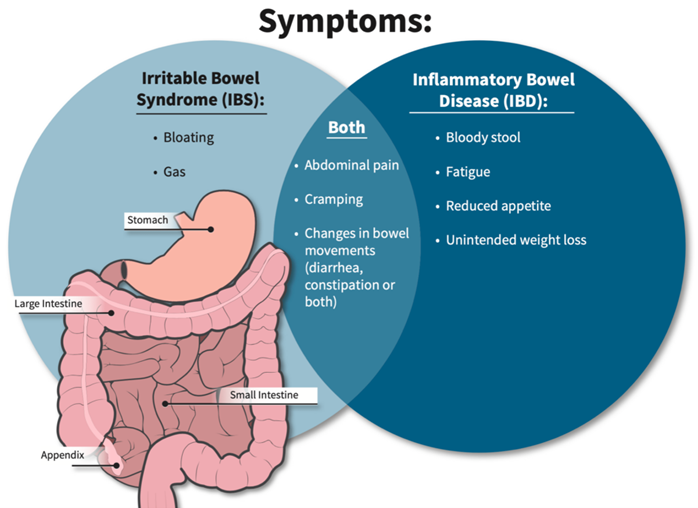A nurse provides education to a client diagnosed with inflammatory bowel syndrome (IBS) about measures to treat diarrhea caused by acute flare-ups. Which statement by the client indicates a need for further teaching?
"I will eat frequent small meals."
"I will increase the intake of leafy greens and other sources of dietary fiber."
"I will increase fluids."
"I will take prescribed medications on schedule to regulate bowel patterns."
The Correct Answer is B
Choice A reason: This is correct because eating frequent small meals can help the client with IBS to avoid overloading the digestive system and triggering diarrhea. The nurse should advise the client to eat slowly chew well, and avoid foods that are spicy, fatty, or gas-producing.
Choice B reason: This is incorrect because increasing the intake of leafy greens and other sources of dietary fiber can worsen diarrhea by increasing stool bulk and motility. The nurse should advise the client to limit or avoid high-fiber foods, such as whole grains, fruits, vegetables, nuts, and seeds, during acute flare-ups of IBS. The client can gradually reintroduce fiber when the symptoms subside.
Choice C reason: This is correct because increasing fluids can help the client with IBS to prevent dehydration and electrolyte imbalance caused by diarrhea. The nurse should advise the client to drink at least 8 glasses of water per day and avoid caffeinated, alcoholic, or carbonated beverages that can irritate the bowel or cause gas.
Choice D reason: This is correct because taking prescribed medications on schedule can help the client with IBS to regulate bowel patterns and reduce diarrhea. The nurse should instruct the client on how to use medications, such as antidiarrheals, antispasmodics, or probiotics, as ordered by the provider. The nurse should also monitor the client for any adverse effects or interactions of the medications.

Nursing Test Bank
Naxlex Comprehensive Predictor Exams
Related Questions
Correct Answer is D
Explanation
Choice A Reason: This is incorrect because phototherapy is not a recommended therapy for contact dermatitis. Phototherapy involves exposing the skin to artificial light sources that emit specific wavelengths of light that can have anti-inflammatory or immunomodulatory effects. Phototherapy can be used for some skin conditions, such as psoriasis or eczema, but not for contact dermatitis.
Choice B Reason: This is incorrect because antibiotics are not a recommended therapy for contact dermatitis. Antibiotics are drugs that kill or inhibit bacteria that cause infections. Contact dermatitis is not an infection, but an allergic or irritant reaction to a substance that comes in contact with the skin. Antibiotics have no effect on contact dermatitis and may cause adverse effects or resistance.
Choice C Reason: This is incorrect because UV light is not a recommended therapy for contact dermatitis. UV light refers to ultraviolet radiation from sunlight or artificial sources that can damage DNA and cause skin cancer or aging. UV light can also worsen contact dermatitis by increasing inflammation and sensitivity to allergens or irritants.
Choice D Reason: This is correct because avoidance is the best therapy for contact dermatitis. Avoidance means identifying and avoiding the substance that causes the skin reaction. This can prevent further exposure and allow the skin to heal. The nurse can help the client by providing education on how to read labels, use protective clothing or gloves, or substitute safer products.
Correct Answer is ["B","D","E"]
Explanation
The correct answers are b, d, and e.
Choice A: Slurred speech.
Slurred speech can be associated with increased ICP due to the pressure effects on the brain areas responsible for speech production. However, it is not typically considered a late sign of increased ICP. It may occur earlier in the progression as the brain's ability to coordinate muscle movements is affected.
Choice B: Bradycardia with a bounding pulse.
Bradycardia with a bounding pulse is a classic sign of Cushing's triad, which is a late and ominous sign of significantly increased ICP. It indicates that the body is attempting to increase arterial blood pressure to overcome the increased ICP and maintain cerebral perfusion. The normal range for adult heart rate is 60-100 beats per minute.
Choice C: Confusion.
Confusion can be an early sign of increased ICP as it can indicate changes in cerebral function. However, it is not specifically a late sign of increased ICP. Early signs of increased ICP can include headache, nausea, and confusion, as the brain is initially responding to the pressure changes.
Choice D: Hypertension with an increasing pulse pressure.
Hypertension with an increasing pulse pressure is another component of Cushing's triad. It reflects the body's compensatory mechanism to preserve cerebral blood flow in the face of rising ICP. An increasing pulse pressure (the difference between systolic and diastolic blood pressure) is a late sign of increased ICP. Normal pulse pressure is typically 30-40 mm Hg.
Choice E: Nonreactive dilated pupils.
Nonreactive dilated pupils are a late sign of increased ICP and indicate pressure on the cranial nerves that control pupil size and reaction to light. This is a grave sign and often indicates impending brain herniation.
Choice F: Hypotension with a decreasing pulse pressure.
Hypotension with a decreasing pulse pressure is not typically associated with increased ICP. In fact, hypertension with a widening pulse pressure would be more indicative of increased ICP as part of Cushing's triad.
Whether you are a student looking to ace your exams or a practicing nurse seeking to enhance your expertise , our nursing education contents will empower you with the confidence and competence to make a difference in the lives of patients and become a respected leader in the healthcare field.
Visit Naxlex, invest in your future and unlock endless possibilities with our unparalleled nursing education contents today
Report Wrong Answer on the Current Question
Do you disagree with the answer? If yes, what is your expected answer? Explain.
Kindly be descriptive with the issue you are facing.
